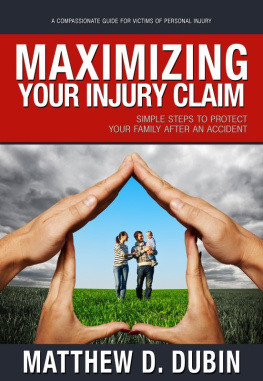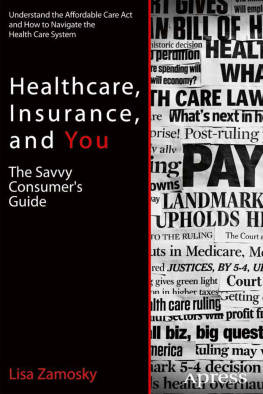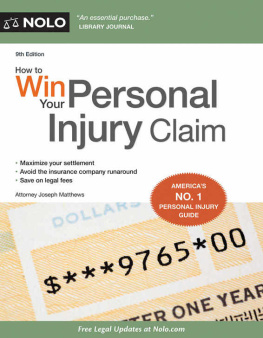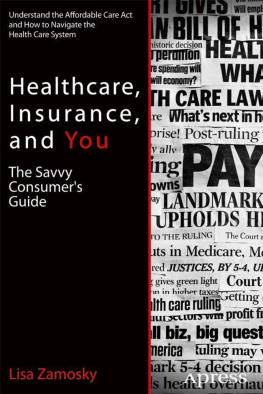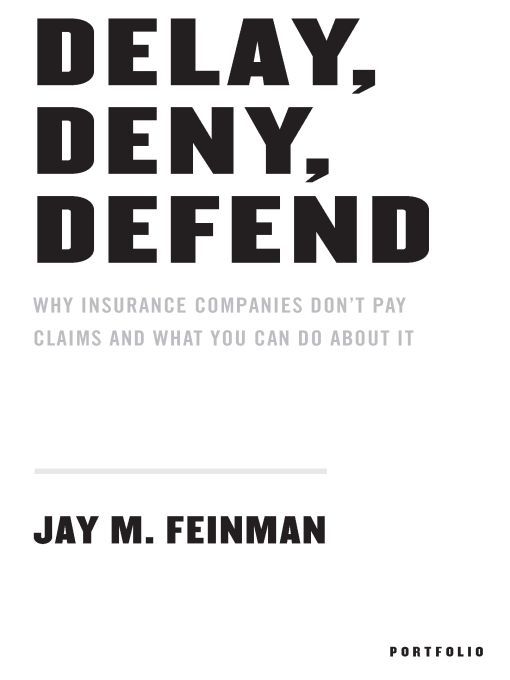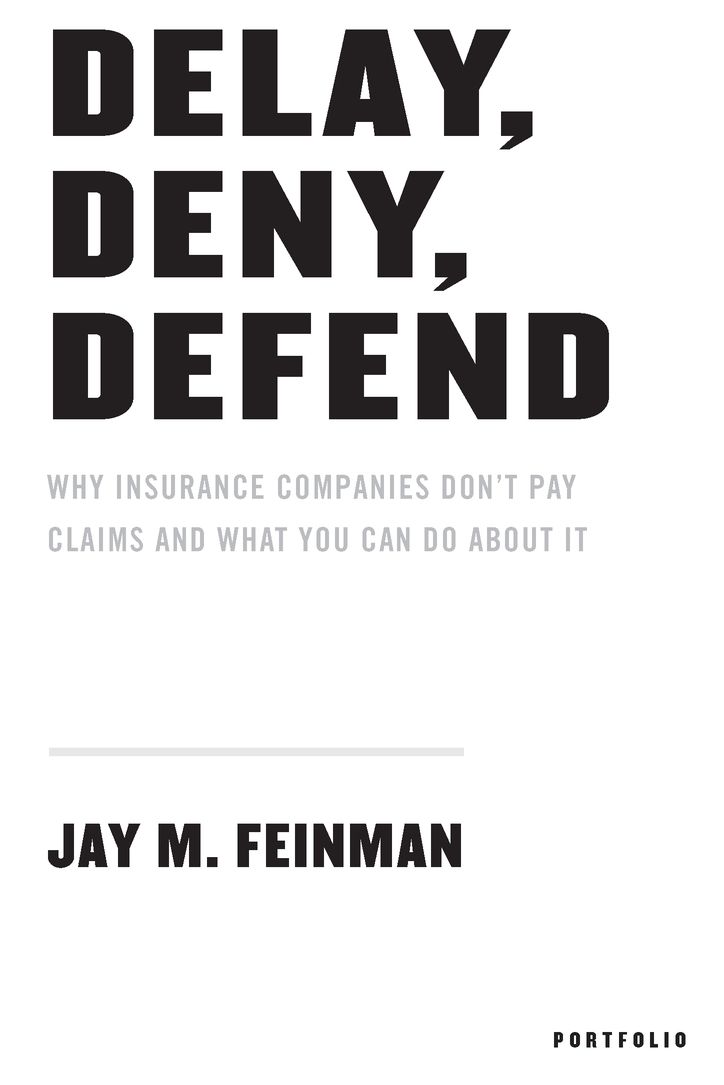Table of Contents
Prologue
YOU ARE DRIVING down the highway when suddenly the left rear wheel falls off your car and the car jolts to the ground, causing an injury to your back. A month later you have surgery for a herniated disk. Although you have no medical insurance, you are confident that your medical bills will be paid. You bought an auto insurance policy from a company that promised to be your good neighbor, and the policy includes a promise to pay for medical expenses caused by an accident. That doesnt happen. Six months after the accident, when your bills total $11,000, your insurance company sends you a check for $1,662.18. You have to undergo a second surgery; the hospital wont let you have physical therapy after the surgery because you cant pay the hospital bill. You hire a lawyer, get more doctors reports, and finally, three years after the accident, the insurance company pays you what it owed in the first place. It happened to Cindy Robinsonher story is told in Chapter 7and it could happen to you.
A pipe breaks in the attic of your house, soaking walls, ceilings, carpets, and cabinets throughout the house. You need money to make repairs, and you expect that your insurance company, which sold you a Deluxe Homeowners Policy and promised that you would be in good hands, will come through for you. Instead, the company fails to adequately investigate the damage, looks for reasons to deny the claim, and refuses to pay for obviously needed repairs like the replacement of sagging, moldy drywall. Eventually the company offers you a check for less than you need to pay for the repairs, take it or leave it. You have to hire a lawyer and sue the company and, eventually, five years after the water leak, you recover enough to pay for your loss. It happened to Thomas Andersonhis story is told in Chapter 8and it could happen to you
Consumers buy car insurance and homeowners insurance to be protected from financial disaster in situations like these. If you are injured in a car accident, you will suffer physical pain and emotional distress. If your house is inundated by water, you will undergo aggravation and inconvenience. No one can do anything about that. But if you have insurance, at least your insurance company will protect you from the financial consequences of the unfortunate events. That is why you buy insurance: to cushion the blow of accidents and injuries. Your insurance company pays for your medical bills, the repairs to your house, and the other expenses you are entitled to under your insurance policy.
Too often, however, it doesnt work that way. The insurance company you trusted will delay paying for your loss, deny payment of part or all of your claim, and aggressively defend the lawsuit you are forced to bring to make the company live up to its promise. The reason is simple: The less the insurance company pays out in claims to you and people like you, the more it makes in profits.
Delay, deny, defend is a violation of consumers reliance on their insurance companies. It hurts people when they are at their most vulnerable and it erodes the trust that all of us put in insurance. This book explores where and how delay, deny, defend occurs, why it has increased, and what can be done to stop it.
Introduction
INSURANCE IS THE great protector of the standard of living of the American middle class. A good job provides the means to acquire a home, a car, a college education for the children, and a comfortable retirement, and insurance secures those things against the uncertainties of life. Houses will burn, but homeowners insurance furnishes funds to rebuild. Cars will crash, but auto insurance pays medical bills and repair costs and guards against potentially massive liability to other people who are injured. Illness, injury, and death will occur, but health insurance, disability insurance, and life insurance remove the burden of cost and replace the lost earnings of the breadwinner.
Insurance has come a long way in five thousand years, from the time when Babylonian merchants found investors who agreed to accept the risk of cargo lost at sea in return for a payment, a transaction that would develop into marine insurance. Today insurance in the United States is a trillion-dollar industry, with 2,700 property/casualty insurance companies collecting $440 billion in premiums and paying $250 billion in claims each year. (Property/casualty insurance mostly protects against property damage and liability to others; personal lines property/ casualty is largely auto and homeowners insurance, the subjects of this book.) State Farm, the industrys giant, has forty-two million policies in force and processes over twelve million claims each year.
Insurance is the great protector of the standard of living of the American middle class, but only when it works. Purchasing an insurance policy is less like buying a product and more like receiving a promise. In return for the policyholders payment of a premium, the insurance company promises to accept the risks of financial loss that the policyholder otherwise could not bear. As a formal matter the promise to indemnify the insured against loss is embodied in the policy document, often fifty pages of eight-point type that is seldom read and less often understood, but the real promise is to provide security against loss. Long before the GEICO gecko promised to save you 15 percent or more on car insurance, the iconic slogans of insurance company advertising expressed that real promise: Like a good neighbor, State Farm is there. Youre in good hands with Allstate.
Insurance doesnt work when the insurance company fails to honor the terms of the policy and its promise of security through the strategy that has become known as delay, deny, defend. The company delays payment of a claim, denies all or part of a valid claim, or aggressively defends litigation the policyholder is forced to bring to get what he is rightfully owed. When insurance doesnt work, the consequences are more severe than when any other kind of company fails to keep its promise. If a homeowner hires someone to paint his house and the painter never shows up, the homeowner can take his money and hire someone else. If the insurance company refuses to pay a claim, it is too late to go elsewhere for another policy; no company will write a policy that will pay for fire damage that has already occurred.
Insurance didnt work for Kim Zilisch, who was in an accident that killed her fianc and permanently injured her. After she filed a claim with State Farm, her insurance company, the response was to delay. State Farms claims adjuster knew her injuries were permanent yet waited four months for a copy of a doctors report he knew didnt exist. The adjuster then concluded without sufficient evidence that Zilischs injuries were not that serious, waited another four months to make an offer to settle her claim, then changed the offer without regard to the facts. A year after her claim was filed Zilisch was awarded $387,500 by an arbitration panel, at which point State Farm finally paid the policy limit of $100,000.
Insurance didnt work for Terry Buttery. When his home was burglarized he called the police and his insurance company, Hamilton Mutual. Buttery completed the claims forms he was given within twenty-four hours but that was only the beginning. Even though he supplied three more statements, receipts for stolen items, repair estimates, and five years worth of tax returns, and gave testimony to Hamilton under oath four separate times, Hamilton still did not pay. So Buttery sued and won. But Hamilton delayed payment even after Butterys judgment was upheld by the Kentucky Supreme Court, hoping that his precarious financial position would force him to settle for less than he was owed.



